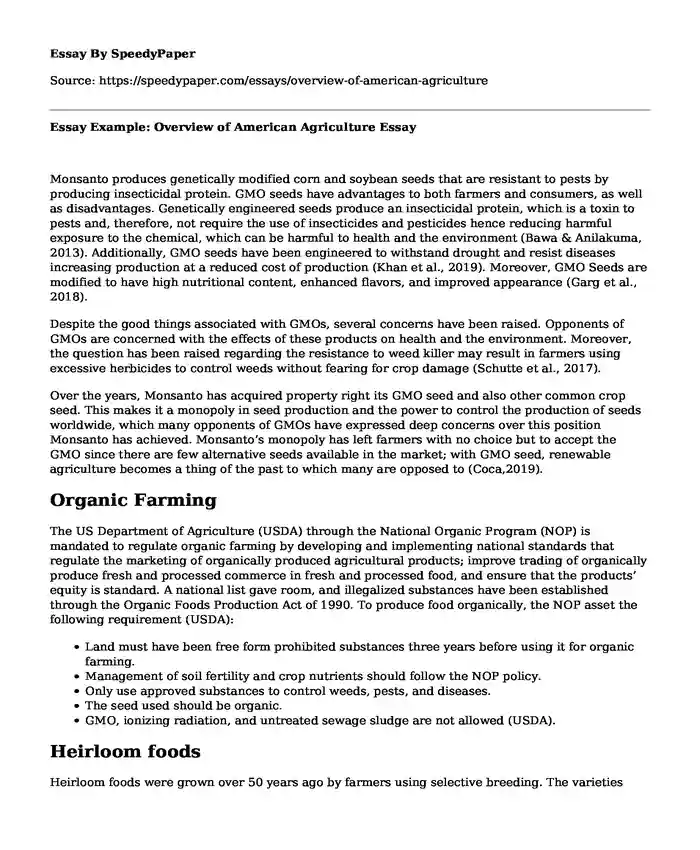
| Type of paper: | Essay |
| Categories: | United States Food Agriculture |
| Pages: | 3 |
| Wordcount: | 720 words |
Monsanto produces genetically modified corn and soybean seeds that are resistant to pests by producing insecticidal protein. GMO seeds have advantages to both farmers and consumers, as well as disadvantages. Genetically engineered seeds produce an insecticidal protein, which is a toxin to pests and, therefore, not require the use of insecticides and pesticides hence reducing harmful exposure to the chemical, which can be harmful to health and the environment (Bawa & Anilakuma, 2013). Additionally, GMO seeds have been engineered to withstand drought and resist diseases increasing production at a reduced cost of production (Khan et al., 2019). Moreover, GMO Seeds are modified to have high nutritional content, enhanced flavors, and improved appearance (Garg et al., 2018).
Despite the good things associated with GMOs, several concerns have been raised. Opponents of GMOs are concerned with the effects of these products on health and the environment. Moreover, the question has been raised regarding the resistance to weed killer may result in farmers using excessive herbicides to control weeds without fearing for crop damage (Schutte et al., 2017).
Over the years, Monsanto has acquired property right its GMO seed and also other common crop seed. This makes it a monopoly in seed production and the power to control the production of seeds worldwide, which many opponents of GMOs have expressed deep concerns over this position Monsanto has achieved. Monsanto’s monopoly has left farmers with no choice but to accept the GMO since there are few alternative seeds available in the market; with GMO seed, renewable agriculture becomes a thing of the past to which many are opposed to (Coca,2019).
Organic Farming
The US Department of Agriculture (USDA) through the National Organic Program (NOP) is mandated to regulate organic farming by developing and implementing national standards that regulate the marketing of organically produced agricultural products; improve trading of organically produce fresh and processed commerce in fresh and processed food, and ensure that the products’ equity is standard. A national list gave room, and illegalized substances have been established through the Organic Foods Production Act of 1990. To produce food organically, the NOP asset the following requirement (USDA):
- Land must have been free form prohibited substances three years before using it for organic farming.
- Management of soil fertility and crop nutrients should follow the NOP policy.
- Only use approved substances to control weeds, pests, and diseases.
- The seed used should be organic.
- GMO, ionizing radiation, and untreated sewage sludge are not allowed (USDA).
Heirloom foods
Heirloom foods were grown over 50 years ago by farmers using selective breeding. The varieties have been handed over from one generation to the other. They possess distinct tastes and flavors. Over the years, with the discovery of hybrid seed, many farmers opted out of growing heirloom seeds for hybrid seed. Hybrids seeds were efficient for commercial farming and had added advantage of high yield, resistant to diseases, and have increased shelf life of the produce. Over the few decades, food enthusiasts have rediscovered diverseness in textures, flavors, and smells in heirloom foods and thus have motivated farmers to try growing heirloom crops commercially (Green 2013).
Monsanto vs. organic and heirloom farming
I support organic and heirloom farmers because Monsanto business practices have the likelihood of impeding small scale farming and destroying renewable agriculture. By imposing contracts that prohibit the reuse of seeds and farmers have to get news seeds for every planting season. Over the years, Monsanto accused farmers of breach of contract and sued them who are practicing renewable agriculture. Monsanto seems to be a company that does not value and support the community instead; its main agenda is to maximize profits (Kucinich, 2014)
References
Bawa, A. S., & Anilakumar, K. R. (2013). Genetically Modified Foods: Safety, Risks, and Public Concerns A Review. Journal of food science and technology, 50(6), 1035-1046. https://pubmed.ncbi.nlm.nih.gov/24426015/Coca Herminio (2019) Monsanto Monopoly? The facts Explained. Gardening Fever.
https://gardeningfever.com/2019/03/25/monsanto-monopoly-the-facts-explained/Local Foods and the Slow Food Movement in Italy. https://www.italian-connection.com/italian-food-culture/italy-slow-food/
Khan, S., Anwar, S., Yu, S., Sun, M., Yang, Z., & Gao, Z. Q. (2019). Development of Drought-Tolerant Transgenic Wheat: Achievements and Limitations. International Journal of Molecular Sciences, 20(13), 3350.
Garg, M., Sharma, N., Sharma, S., Kapoor, P., Kumar, A., Chunduri, V., & Arora, P. (2018). Biofortified Crops Generated by Breeding, Agronomy, And Transgenic Approaches Are Improving Lives of Millions of People Around the World. Frontiers in Nutrition, 5, 12. https://www.ncbi.nlm.nih.gov/pmc/articles/PMC5817065/
Green, Lee. (2013). From Past to Present: Why Heirloom Varietals Matter. Biodiversity
Cite this page
Essay Example: Overview of American Agriculture. (2023, Nov 05). Retrieved from https://speedypaper.net/essays/overview-of-american-agriculture
Request Removal
If you are the original author of this essay and no longer wish to have it published on the SpeedyPaper website, please click below to request its removal:
- Free Essay about Sinan Antoon's Novel Ijaam
- Free Essay Example: Employment Relations
- Is Regionalism in the Post Cold War Era Beneficial to the European Neighbourhood Policies? Free Paper
- Essay Example: Human Services Initiatives
- Impacts of Covid-19 on America's Universities - Free Paper Sample
- Free Essay on Wildfires: A Case Study of Los Angeles, California
- The Resurgence of Vintage T-Shirts in the United States - Essay Sample
Popular categories




